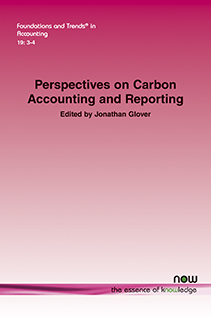Innovations in Corporate Carbon Accounting
By Stefan Reichelstein, Mannheim Institute for Sustainable Energy Studies, ZEW-Leibniz Centre for European Economic Research, University of Mannheim, Germany and Stanford Graduate School of Business, USA, reichelstein@uni-mannheim.de
Abstract
With the climate crisis intensifying in urgency, the stakeholders of global companies are clamoring for more reliable reporting regarding a company’s overall carbon footprint as well as the emissions attributed to individual products and services. In this study, I synthesize recent innovations by select firms, industry consortia, and academic studies in the field of corporate carbon accounting. These innovations pertain to the architecture of a firm’s carbon accounting system, for instance, the adoption of transactional double-entry bookkeeping that enables stock variables to be tracked separately from periodic flow variables. In addition to questions of architecture, recent contributions to the field of carbon accounting have raised a host of specific accounting issues pertaining to boundaries, allocation rules and the recognition of carbon credits. Ideally, these issues will be addressed through a set of commonly accepted carbon accounting principles, akin to Generally Accepted Accounting Principles. Wide adoption of such principles would enhance the comparability and reliability of corporate carbon reports, and thereby provide companies with stronger long-term incentives to embark on effective decarbonization pathways.
Perspectives on Carbon Accounting and Reporting
Double-entry bookkeeping revolutionized financial accountability centuries ago, and today, its principles are shaping a new frontier—carbon accounting. The articles in this issue on Perspectives on Carbon Accounting and Reporting were contributed by leading academic and practitioner experts on carbon accounting. The authors highlight key challenges, including responsibility for Scope 3 emissions, reliance on third-party estimates, the allocation of emissions to products, the importance of integrating carbon accounting with traditional financial and managerial accounting systems, and the need for commonly accepted carbon accounting standards.

Companion
Foundations and Trends® in Accounting, Volume 19, Issue 3-4 Special Issue: Perspectives on Carbon Accounting and Reporting
See the other articles that are also part of this special issue.